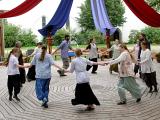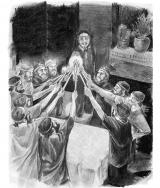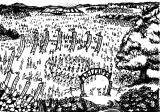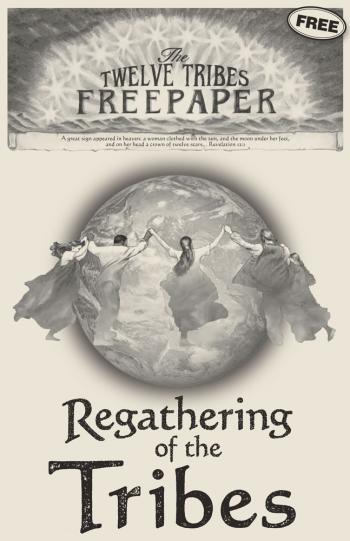Why Twelve Tribes
Feb 24, 2021
And now I am standing trial for the hope of the promise made by God to our fathers, the promise to which our twelve tribes hope to attain [for them], as they earnestly serve God night and day. And for this hope, O King, I am being accused by Jews. (Acts 26:6-7)
Our twelve tribes have nothing to do with mystical tribalism, as in the beliefs of some. Rather, we are speaking of people actually dwelling together in unity, living a tribal life in twelve different geographical areas on the earth, so as to be a light to the nations.
When Paul, in his defense before Agrippa, referred to “our twelve tribes” in Acts 26:7, surely he was not referring to the Jews who were accusing him. There was no point in flattering them about “earnestly serving God night and day.” The Master had already prophesied to the Jews that, “The kingdom of God will be taken away from you, and be given to a nation producing the fruit of it.” 1 A new nation had to take the place of the old. And this is exactly what Paul meant when he wrote to the Gentile Ephesians:
You were at that time separate from Christ, excluded from the common-wealth of Israel, and strangers to the covenants of promise, having no hope and without God in the world. But now in Christ Jesus you who formerly were far off have been brought near by the blood of Christ... So then, you are no longer strangers and aliens, but you are fellow citizens with the saints, and are of God’s household, having been built upon the foundation of the apostles and prophets… (Ephesians 2:12-13,19-20)
It was through apostles like Paul that this new nation was being formed, the commonwealth of Israel, or the Israel of God as Paul called it. 2 This new nation was not one formed by physical descendants, but of those born of the Spirit. 3 It was a nation of an entirely different order, composed only of disciples, because only they had given up their old life 4 outside the commonwealth of Israel to be born again into the new holy nation. 5 Only they were the ones who had taken the Master seriously enough to put aside their own father, mother, wife, children, brothers, sisters, and yes, even their own life, in order to follow Him as He had commanded. 6 And they certainly respected His word enough to forsake their own possessions, which was the only way in which they could even begin to qualify as disciples. 7
The whole emphasis of the Master’s preaching was the kingdom of God and how to enter it. In relative importance, the topic of the kingdom is mentioned three times as often as salvation in the New Testament. So it was absolutely essential that a nation be prepared that could inherit that kingdom. 8 It had to be a nation bonded together with a deeper commitment than mere family ties or blood relations. And being part of that new nation was what being a disciple was all about — and still is to this very day.
Do You Believe in Prophecy?
Many Christians today are puzzled about this notion of a holy nation, for they do not see themselves as part of a nation, which is understandable. Some even regard these passages as merely symbolic, a mystical ideal, while others fancy that they must somehow refer to the Jews in Palestine, or perhaps Jewish Christians. But do you believe in Biblical prophecy? Surely you do!
Paul the Apostle certainly did, so much so that in fact he applied it directly to himself and Barnabas when he said, “For thus the Lord has commanded us, ’I have placed you as a light for the nations, that you should bring salvation to the end of the earth.’” 9 But is it so unreasonable to think that the apostles were raising up a twelve-tribed nation, a New Covenant Israel, composed of both Jews and Gentiles, united together by the Holy Spirit? No, not at all, because the Scripture from which Paul quoted said first, “It is too small a thing that you should be my servant to raise up the tribes of Jacob...” 10 Here’s a little Bible quiz: Jacob’s sons each became the head of a tribe, and all the tribes together were called Israel. How many sons did Jacob have? How many tribes were there?
Surely James knew when he wrote “... to the twelve tribes who are dispersed abroad, greetings.” 11 But Old Covenant Israel had not been a twelve-tribed nation since the days of King Solomon! Ten of the tribes vanished from history in the Assyrian captivity, some 700 years before James wrote his letter. Had James gone off the deep end? Who was James writing to, anyway?
The apostle Peter knew exactly who, when he wrote:
For you are a chosen race, a royal priesthood, a holy nation, a people for God’s own possession, that you may proclaim the excellencies of Him who has called you out of darkness into His marvelous light; for once you were not a people, but now you are the people of God; you had not received mercy, but now you have received mercy. (1 Peter 2:9-10)
Clearly Peter was addressing a newly-formed people who were once not a people. Something had changed in their life to warrant them being called a people, for if they had remained in their same old houses, worked their same old jobs, and only believed in Jesus, they would still be not a people. They would still remain integrated into society in the same way as Christianity is today.
“That’s all well and good,” you might say, “but why doesn’t the rest of the New Testament say anything about the church being composed of twelve tribes?”
Don’t be hasty! Have you ever heard of the church being called the “bride” of Messiah? It comes from Ephesians and Revelations:
… that He might present to Himself the church in all her glory, having no spot or wrinkle or any such thing; but that she should be holy and blameless. (Ephesians 5:26-27)
Let us rejoice and be glad and give the glory to Him, for the marriage of the Lamb has come and His bride has made herself ready… (Revelation 19:7)
But the Book of Revelation gives us two other pictures of the bride, which is the church, revealing her true composition:
And a great sign appeared in heaven: a woman [the same word translated as “wife”] clothed with the sun, and the moon under her feet, and on her head a crown of twelve stars? (Revelation 12:1)
And one of the seven angels who had the seven bowls full of the seven last plagues, came and spoke with me, saying, “Come here, I shall show you the bride, the wife of the Lamb. And he carried me away in the Spirit to a great and high mountain, and showed me the holy city, Jerusalem, coming down out of heaven from God, having the glory of God. Her brilliance was like a very costly stone, as a stone of crystal-clear jasper. It had a great and high wall, with twelve gates, and at the gates twelve angels; and names were written on them, which are those of the twelve tribes of the sons of Israel. (Revelation 21:9-12)
What do all these references signify? Twelve apostles… our twelve tribes… the commonwealth of Israel… the Israel of God… a holy nation… a crown of twelve stars… twelve tribes of the sons of Israel… Get the picture?
We have come to see that the outpouring of the Holy Spirit on the day of Pentecost gave birth to a rich tribal life of togetherness and mutual care and accountability that exposed the selfishness of that perverse generation. 12 This life increased and developed into a twelve-tribed holy nation of priests 13 who earnestly served God night and day, 14 intended to fulfill Malachi 1:5,11. She should have grown to full stature as the spotless bride of Revelation 19:7, for whom Yahshua, the Bridegroom, would return in triumph as the rest of the chapter describes. But something happened. Her love waned and the prophetic warnings of Romans 11:22, 2 Corinthians 11:2-3, and Revelation 2:5 came upon her:
Behold then the kindness and severity of God; to those who fell, severity, but to you, God’s kindness, if you continue in His kindness; otherwise you also will be cut off. (Romans 11:22)
For I am jealous for you with a godly jealousy; for I betrothed you to one husband, that to Christ I might present you as a pure virgin. But I am afraid, lest as the serpent deceived Eve by his craftiness, your minds should be led astray from the simplicity and purity of devotion to Christ. (2 Corinthians 11:2-3)
Remember therefore from where you have fallen, and repent and do the deeds you did at first; or else I am coming to you, and will remove your lampstand out of its place — unless you repent. (Revelation 2:5)
The virgin bride defiled herself and became the harlot of Revelation chapters 17 and 18 — Christianity:
And he cried out with a mighty voice, saying, “Fallen, fallen is Babylon the great! And she has become a dwelling place of demons and a prison of every unclean spirit, and a prison of every unclean and hateful bird.” (Revelation 18:2)
The word become indicates a transition from one nature to another, as this is a direct reference to Isaiah 1:21:
How the faithful city has become a harlot, She who was full of justice! Righteousness once lodged in her, but now murderers. (Isaiah 1:21)
But as Romans 9:29 anticipates, a seed of that early, vital life was preserved in heaven, awaiting the fullness of time when the faith to obey the true gospel would again be kindled in a people...
I have come to cast fire upon the earth; and how I wish it were already kindled! But I have a baptism to undergo, and how distressed I am until it is accomplished! Do you suppose that I came to grant peace on earth? I tell you, no, but rather division; for from now on five members in one household will be divided, three against two, and two against three... father against son, and son against father; mother against daughter, and daughter against mother; mother-in-law against daughter-in-law, and daughter-in-law against mother-in-law. (Luke 12:49-53)
We know that there are many sincere Christians in the many churches around the world. If they are truly God’s people, they will respond to His appeal, or call, for them to come out of “her.” 15 Now there is a place for the sincere to come into. Every sincere one who wants to come out of that fallen organized religion must be baptized into the true Body of God that is formed by obedience to the Gospel — being washed of their former life, and of their allegiance to what is false. 16



